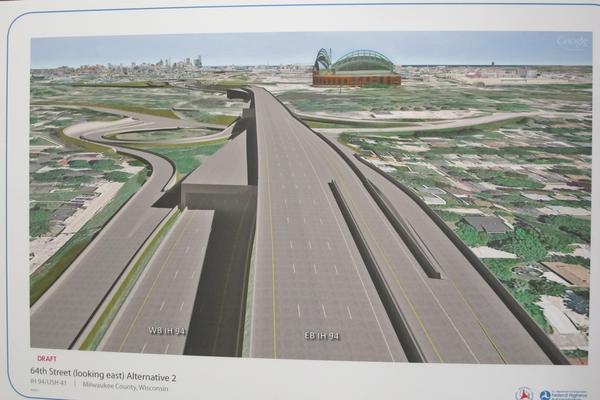Monday night, as the Wisconsin DOT went through the motions of a Power Point presentation about the latest highway expansion it wants to gouge through Milwaukee, a groups of protesters outside the meeting shouted their frustration with an agency that has spent lavishly on roads to the exclusion of all other modes.
The protesters' message was simple. "Stop the highway." Instead of sinking a billion dollars into another highway that won't solve the region's transportation problems, they called for different options: better transit, walking, and biking connections.
Right now, the state is only thinking about cramming more cars into the Milwaukee transportation network. Wisconsin has settled on two options for the Interstate 94 corridor, and both involved widening 3.5 miles of highway. The first proposal is an eight-lane at-grade freeway. The second and even more ridiculous option is a double-decker freeway. WisDOT put forward this latter design out of a desire to add lanes -- to "manage congestion" -- without having to actually unearth the graves of veterans in the cemetery surrounding the road.
But the protesters, who represent a coalition of groups from around the state and Milwaukee, reject both of the alternatives. That's why instead of attending the meeting on Monday, they were outside protesting. The Wisconsin Department of Transportation should go back to the drawing board, said Bruce Speight of the Wisconsin Public Interest Research Group, one of the organizing groups.
"We don’t need to expand the highway," he said. "We need to give people real options."

Over the last 10 years, Milwaukee transit riders have endured service cuts and fare hikes as budget pressures squeeze their transit agency. Many low-income Milwaukee residents who rely on transit aren't able to access jobs, said Speight. Meanwhile, the state has been siphoning funds from local road repairs to build ever more extravagant highway projects.
The same coalition, representing racial minorities in Wisconsin, recently settled in court with the state over the $1.7 billion "Zoo Interchange" project, which they alleged was discriminatory. After a judge issued an interim ruling in their favor, the groups agreed to a settlement that awarded $13.5 million in transit funding.
While that was an important win, $13.5 million is peanuts compared to what Wisconsin spends to move people faster in cars. Speight said the DOT's billion-dollar proposal for I-94 is expected to save the average commuter just four minutes.
"They were talking about the need to probably widen it again in 25 years," he said. "If we provide more and better options... we’ll actually solve the problem and give the people of Milwaukee better roads and transit options."
"This is just an unnecessary, misguided, and wasteful project."





